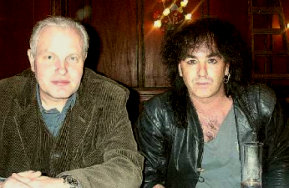|
Interview Johannes Schmoelling
|
Von Tönen und
|
From Sounds and
|
||||||||||||||||||||||||||||||||||||||||||||||||||||||||||||||||||||||
|
Tangerine Dream haben seit ihrer Gründung 1967
zahlreiche Metamorphosen durchlaufen: |
Since their formation in 1967,
Tangerine Dream went through many metamorphoses: |
|
Als das "klassische" Line Up gilt nach wie vor die Besetzung Edgar Froese, Chris Franke und Peter Baumann, die von 1974 bis 1980 die auch heute noch typischen, teilweise improvisierten, von Sequenzern gesteuerte Alben wie "Stratosfear", "Ricochet" oder "Encore" einspielten. |
The Edgar Froese, Chris Franke, and Peter Bauman line-up is still regarded as the classical one. Between 1974 and 1980, they recorded the partly improvised, sequencer-driven and even today regarded as typical albums like "Stratosfear," "Ricochet" or "Encore." |
|
Doch bereits Ende der 70er Jahre stellte sich für Edgar Froese die Frage, ob er diese Stilistik fortführen, oder nach neuen, strukturierteren Wegen suchen soll. |
But at the end of the 70s Edgar Froese was already asking himself whether this style could be continued, or whether new, more structured ways should be sought. |
|
Diese Frage wurde ihm nach dem Weggang von Peter Baumann erleichtert
und mit der Produktion des 79er Albums "Force Majeure" erschwert: Schon
auf diesem Album versuchte die zum Duo um Froese und Franke reduzierte
Band, wieder "erdiger", rockiger und gradliniger zu klingen. |
This task was simplified after the departure of Peter Baumann, but then
got more difficult with the 79 production of "Force Majeure." On this
album he had already tried to make the band, reduced to the Froese and
Franke duo, more "earthy," rock-oriented and streamlined. |
|
Den fand Edgar Froese 1980 in Johannes Schmoelling. |
who Edgar Froese found in 1980 in the person of Johannes Schmoelling. |
|
Der 1950 geborene Schmoelling entsprach wenig dem Bild des genialen Dilettanten, das die Band bislang verkörperte: Er war ausgebildeter Organist, Tonmeister und arbeitete als Toningenieur an der "Schaubühne am Halleschen Ufer" in Berlin, als ihn Froese, nicht ohne Bedacht und Hintersinn, in die Band holte... |
Born 1950, Schmoelling did not fit in very well with the picture of a genius dilettante that the band had so far presented. He was a trained organist and sound engineer and worked as such at the "Schaubuehne am Halleschen Ufer" theater in Berlin, when Froese, not without careful contemplation, took him into the band... |
|
Johannes Schmoelling: "Ich hatte damals eigentlich kaum
eine Ahnung, wer Tangerine Dream überhaupt ist, der Kontakt kam
auch auf Umwegen zustande. Mir persönlich war damals nur klar,
dass mich der Beruf des Toningenieurs nicht ausfüllt und ich
wieder nach Möglichkeiten suchte, musikalisch direkt tätig zu
werden. |
Johannes Schmoelling: "Actually I had almost no idea at
that time who Tangerine Dream was. The connection did not come
directly. I realised that my job as a sound engineer did not satisfy me
completely and I was looking for other possibilities to musically get
more directly active. |
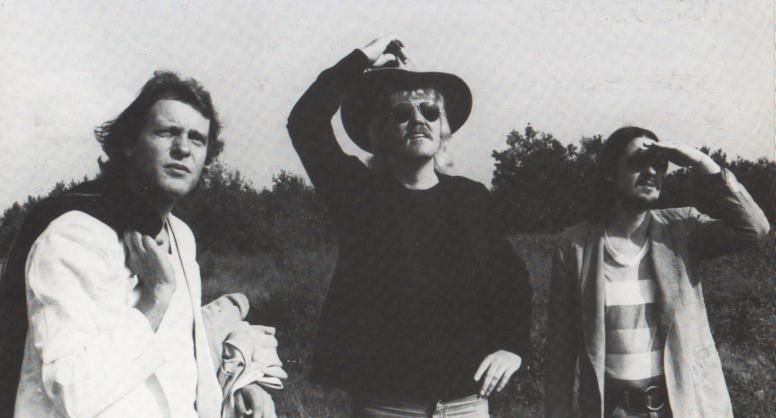
Tangerine Dream 1980: Johannes Schmoelling,
Edgar Froese, Chris Franke
|
Das erste Album, an dem Johannes Schmoelling mitwirkte, war das 80er Album "Tangram". |
The first album in which JS participated was the 1980 album "Tangram." |
|
Es war unüberhörbar, dass sich etwas verändert hatte: Zum großen Bedauern vieler Fans waren die improvisierten, sphärischen, verspielten Sequenzer-Linien einem weitaus strukturierteren, aber nicht minder farbigen Klangbild gewichen... |
It couldn't be missed that something had changed. To the big regret of many fans, the improvised, spherical and playful sequencer lines vanished and made room for far more structured, but not less colourful sound images... |
|
Johannes Schmoelling: "Es freut mich immer, wenn so etwas
auch retrospektiv wahrgenommen wird. Viele sind gar nicht in der Lage,
das zu hören. |
Johannes Schmoelling: "I'm always happy when such things
are retrospectively recognised. Many people are not able to hear
that. |
|
Ein Handwerker, wie ihn die Gruppe, nach Einschätzung Froeses, dringend benötigte... |
A craftsman that the band, according to Froese, urgently needed... |
|
Johannes Schmoelling: "Edgar hatte immer ein sehr gutes Gespür dafür gehabt, wen und was er in die Band aufnehmen konnte - und er hatte auch klare Vorstellungen von dem, was nicht hineinpasste. Edgar und ich hatten da durchaus einige Reibereien - vor allem wenn er der Meinung war, ich würde zu sehr in populistische, rockige oder jazzige Gefilde vordringen. In diesen Fällen wurde ich immer gebremst - und das war auch okay, denn er hat das Markenzeichen hochgehalten." |
Johannes Schmoelling: "Edgar always had a good sense for who and what he could take into the band. And he had clear ideas about what didn't fit. Edgar and I did had some arguments - especially when he was of the opinion that I would go to far into popular, rock or jazz oriented spheres. In such cases I was always slowed down - and that was okay, because it kept up the trademark." |
|
Obwohl Tangerine Dream sich schon 1977 mit dem Soundtrack zu dem William Friedkin-Film "Sorcerer" auch als Filmmusiker einen Namen machen konnten, gelang es der Formation erst mit Johannes Schmoelling, auf diesem Markt wirklich Fuß zu fassen. Mehr als das: Die Tür nach Hollywood wurde mit dem Soundtrack zu Michael Mann's Debüt "Thief" (Der Einzelgänger, 1981) recht weit aufgestoßen... |
Although in 1977 Tangerine Dream was already able to achieve credits as film music composers with the soundtrack to the William Friedkin movie "Sorcerer," it succeeded in establishing itself only with Johannes Schmoelling. More than that: With the soundtrack to Michael Mann's debut, "Thief" (Der Einzelgänger [translation: "The Loner"], 1981), the door to Hollywood opened wide... |
|
Johannes Schmoelling: "Es war vielleicht auch einfach die Zeit, diese Art Klangstilistik mit Filmen zu verknüpfen. Gerade die Regisseure in Hollywood haben das sehr früh erkannt. Es war klar, dass unsere Musik nicht zu 'Doktor Schiwago' passt, doch für Actionfilme war sie sehr gut geeignet." |
Johannes Schmoelling: "Maybe it was simply the time to combine this sound style with movies. Especially the film directors in Hollywood realised this very early. It was clear that our music didn't fit 'Dr. Zhivago', but for action movies it fit very well." |
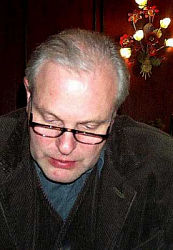
Johannes Schmoelling, November 2001
|
Dennoch ist es nicht gerade eine Selbstverständlichkeit, dass ausgerechnet amerikanische Regisseure und Produzenten auf eine deutsche Band aufmerksam wurden, die in ihrer Heimat immer noch den ungerechtfertigten Ruf als Dilettanten oder "Knöpfendrücker" besaß.... |
But still, it was not taken for granted that American directors and producers would pay attention to a German band that in its own country still had the unjustified reputation as botton-pushing dilettantes... |
|
Johannes Schmoelling: "Ich denke, Tangerine Dream waren in Bezug auf Sound und Instrumentarium damals ziemlich einmalig. Es war aber schon bezeichnend, dass die Band im Ausland weitaus populärer war als in ihrer Heimat. Bis auf zwei Musiken für den 'Tatort' gab es hierzulande niemanden, der der Meinung war, dass unsere Musik geeignet wäre. Die Amerikaner haben viel früher als andere die Bedeutung und das Potenzial der Filmmusik entdeckt - und damit auch experimentiert. Michael Mann hat in 'Thief' unsere Musik z.B. unglaublich laut eingesetzt, so dass ihn einige Kritiker gar für verrückt erklärt haben. Doch genau das war seine Intention. Gerade das sehr monotone Sequenzing, das mich bei unseren Konzerten manchmal nervte, funktioniert hier perfekt!" |
Johannes Schmoelling: "I think that TD was very unique at that time regarding its sound and instrumentation. But it was remarkable that it was far more popular abroad than in its home country. Except for two pieces for 'Tatort' [German TV series] there was nobody here who thought that our music was suitable. The Americans realised the impact and potential of film music much earlier - and experimented. Michael Mann for instance used our music at incredibly high volume in 'Thief' so that some critics called him crazy. But this was exactly his intention. Especially the monotonous sequencing, which I found so nerve-wrecking in our concerts, worked perfectly there." |
|
Mag es nicht auch in erster Linie damit zu tun gehabt haben, dass die Musik von Tangerine Dream ohnehin sehr filmische Qualitäten besaß, mitunter gar als Soundtrack für den Kopf - ganz ohne visuelle Ergänzung - funktionierte? |
Could it be in the first place that the music of TD had film qualities anyway - even worked as a soundtrack for the mind - without visual enhancements at all? |
|
Johannes Schmoelling: "Absolut! Unsere Musik hat stets Raum gelassen für Bilder und Phantasien! Und das haben auch Regisseure schnell begriffen. Diese Musik war sehr flächig und diente gleichzeitig als Verstärkung der Bilder, anstatt sie nur zu untermalen." |
Johannes Schmoelling: "Absolutely! Our music always kept some space free for pictures and imagination. And the film directors realised this quickly. This music was very broad and served at the same time to amplify the pictures instead of just supporting them." |
|
Nicht zuletzt deswegen wurden Tangerine Dream auch von namhaften
Regisseuren sehr respektvoll behandelt. |
Not only because of that, Tangerine Dream was treated very respectfully
by film directors. |
|
Johannes Schmoelling: "Das ist völlig richtig. Das
ist genau die Freiheit, die ich als Filmkomponist heute so sehr
vermisse. Heute wird man gezwungen, direkt an dem Bild zu kleben und
plakativ darauf zu reagieren. |
Johannes Schmoelling: "That is completely correct. That is exactly the freedom I miss so very much today as a soundtrack composer. Today one is forced to stick exactly to the pictures without complaining. The work methods were completely different in those days. First, we had a lot of time. And the directors took more risks and were much more involved. Although we took a lot of freedoms, the work and confrontation with the film material was extremely intensive, and we would never have allowed ourselves to use pre-fabricated or even old material." |
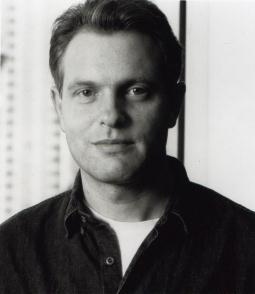
Johannes Schmoelling, 1990
|
Direkt und naiv gefragt: Wie hat Schmoelling und die Band damals an den Soundtracks gearbeitet? |
Asking directly and innocently: How did Schmoelling and the band work on soundtracks? |
|
Johannes Schmoelling: "Ich habe damals, wie heute
übrigens auch, immer versucht, direkt zu den Bildern zu spielen,
zu komponieren oder zu improvisieren. Mit dem Bild kamen die Ideen.
Dabei haben wir nie zwanghaft versucht, die Stimmung des Bildes zu
untermalen oder zu stützen. Das hat aber auch niemand von uns
verlangt. |
Johannes Schmoelling: "I always tried - and still do so
today, by the way - to play, compose, or improvise directly in response
to the images. With the pictures came the ideas. We never forced
ourselves to support or decorate the mood of the image. Nobody expected
this anyway. |
|
Muss - oder besser gefragt - soll ein Soundtrack auch ohne Bilder funktionieren? |
Does - or better, should - a soundtrack also work without pictures? |
|
Johannes Schmoelling: "Absolut. Ich weiß nicht, wie Edgar diese Frage beantworten würde und ich kann hier auch nicht für die Band sprechen, doch ich fühle mich da als Musiker einfach verantwortlich. Ich kann nicht erwarten, dass jemand, der die CD kauft, auch den Film dazu gesehen hat. Wenn ich etwas aus dem Zusammenhang herausnehme und der Klang funktioniert nicht ohne das Bild, so muss ich diese verloren gegangene visuelle Komponente akustisch ergänzen. In dieser Hinsicht habe ich einen sehr hohen Anspruch - und ich habe immer wieder dazu angetrieben, die Soundtracks so zu bearbeiten, dass sie auch ohne die Bilder für den Hörer Sinn machen." |
Johannes Schmoelling: "Absolutely. I don't know how Edgar would answer this question and I cannot speak for the band, but I simply feel responsible as a musician. I cannot expect that somebody who buys the CD has seen the movie. If I break the connection and the sound won't work without the picture, then I have to complete this lost visual component acoustically. I set myself a high standard there, and I was always driving myself to work on these soundtracks so that they also make sense to the listener without the pictures." |
|
Tangerine Dream's Arbeiten für amerikanische Filme
hinterließen nicht zuletzt in Amerika selbst Eindruck - und
fanden viele Nachahmer... |
Tangerine Dream's work for American movies did make some impression in
America, and found a few imitators... |
|
Johannes Schmoelling: "Dass Jan Hammer den Zuschlag
für 'Miami Vice' bekam, hat Edgar Froese sehr genervt, denn auch
er war hinter diesem Auftrag her. |
Johannes Schmoelling: "The fact that Jan Hammer got the
job for 'Miami Vice' made Edgar Froese really upset, because he tried
to get this one as well. |
|
War das Arbeiten mit elektronischen Equipment selbst in den 80er Jahren noch eine ungewöhnliche Methode, so arbeitet heute nahezu jeder Filmkomponist mit digitalen Computern. Der Komponist und Musiker kann nun viel direkter und punktierter auf die Bilder reagieren... |
As much as working with electronic equipment was, even in the 80s, an unusual method, almost every soundtrack composer works with digital computers today. The composer and musician can react much more directly and more connected to the images... |
|
Johannes Schmoelling: "Der Vorteil ist ganz eindeutig die
Tatsache, dass man nun viel schneller, exakter und auch virtueller
arbeiten kann. Noch viel wichtiger ist mir persönlich allerdings,
dass ich mir meine spontanen Improvisationen zu den Bildern ausdrucken
und auf der Grundlage dieser Noten eine richtige Komposition entwickeln
kann. |
Johannes Schmoelling: "The advantage is simply the fact
that you can work much faster, more precisely and virtual. |
|
Ebenso wie das Gros seiner Kollegen, arbeitet Johannes Schmoelling heute fast ausschließlich mit digitalen Geräten. Sowohl auf seinen Solowerken als auch in seiner Tätigkeit als Filmkomponist, vornehmlich für das ZDF ("Zu treuen Händen", "Ein starkes Team") |
Just like most of his colleagues, Johannes Schmoelling works almost only with digital equipment today - both on solo works and as a soundtrack composer, primarily for the ZDF [big German TV channel] ("Zu treuen Händen", "Ein starkes Team" [two programs - translation: "In Good Hands", "Heavyweights"]). |
|
Johannes Schmoelling: "Es geht leider nicht anders. Ich
kann dem ZDF nicht sagen, dass ich jetzt zwei Wochen warte, bis mein
analoger Synthesizer den passenden Sound rausspuckt. Rein emotional
würde ich gerne wieder so wie damals arbeiten, doch das geht
wahrscheinlich allen Kollegen so und ist bedauerlicherweise nicht
realisierbar. |
Johannes Schmoelling: "Unfortunately it won't work
otherwise. I cannot tell the ZDF that I am waiting for two weeks until
my analog synths spit out the suitable sound. Emotionally I would love
to work like in the old times again, but probably most of my colleagues
experience that and unfortunately, it is not realistic. |
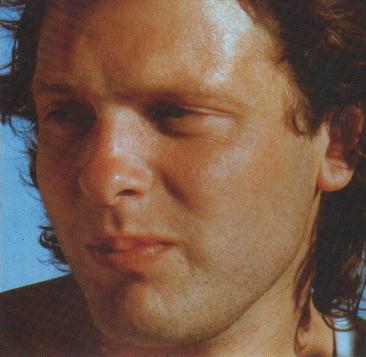
Johannes Schmoelling, 1982
|
Die Studioarbeiten waren dem Perfektionisten und Komponisten Schmoelling weitaus lieber als die in seiner Zeit ebenfalls reichlich veröffentlichten, immer noch improvisierten Live-Alben wie "Quichotte" (1981), "Logos" (1982) oder "Poland" (1984). |
The studio work was far more to the liking of the perfectionist and composer Schmoelling than was the, in those times, equally numerous improvised live albums like "Quichotte" (1981), "Logos" (1982) or "Poland" (1984). |
|
Johannes Schmoelling: "Was wir damals gemacht haben, war
nicht immer das Gelbe vom Ei - und es ist kein Geheimnis, dass ich mit
den Live-Aufnahmen so meine Schwierigkeiten habe. Doch ich musste schon
sehr früh lernen, damit umzugehen. |
Johannes Schmoelling: "What we did then was not always
hitting the mark - and it is no secret that I had my difficulties with
our live performances. But I had to learn to deal with that very
early. |
|
Das kam danach in Massen: Von 1980 bis 1985, also in der Zeit, als
Johannes Schmoelling Mitglied der Band war, produzierten Tangerine
Dream für ihre Verhältnisse zwar relativ wenige, nämlich
nur 5 Studioalben - dafür aber über ein Dutzend Soundtracks,
von denen 9 veröffentlicht wurden! |
That went on a lot from 1980 to 1985, thus during the time that
Schmoelling was a member of the band, Tangerine Dream produced only 5
studio albums, relatively few by their standards, but a dozen
soundtracks, of which 9 were published. |
